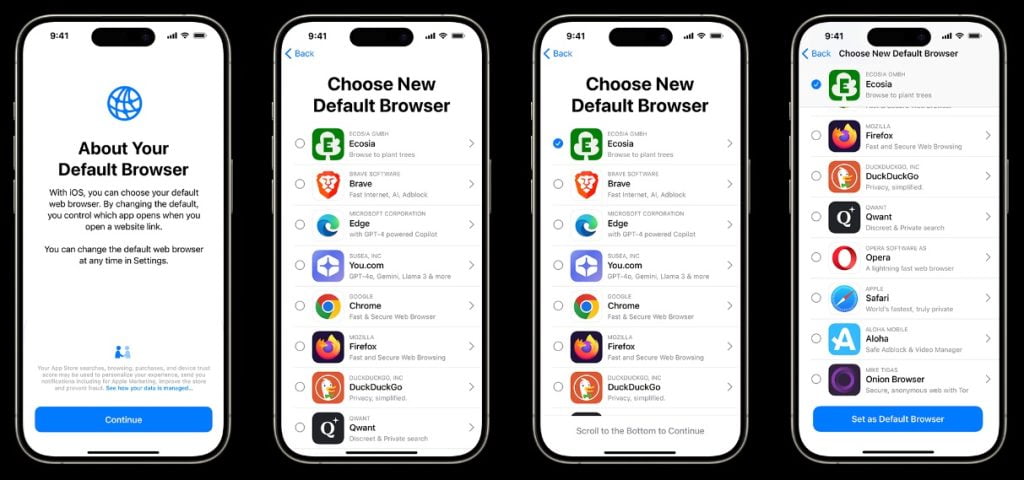iOS 18 in EU :Apple has just announced significant changes coming to iOS and iPadOS for users in the European Union (EU).
These updates, set to roll out by the end of this year, are designed to comply with the Digital Markets Act (DMA) requirements.
Let’s dive into what these changes mean for EU users and how they might impact the iOS experience.
iOS 18 in EU Browser Choice: A New Era of Freedom
One of the most notable changes is the revamped browser choice screen. Here’s what EU users can expect:
Enhanced Information for Developers
Browser developers will now have access to more data about their browser’s performance on iOS devices. This includes:
- Selection rates
- Default selection data
This information will be available through an API in App Store Connect, allowing developers to better understand user preferences and improve their offerings.
Updated Display Rules
The browser choice screen will now appear:
- To all EU users with Safari as their default browser
- Upon the first launch of Safari after the update
- Once per device (instead of once per user)
Users with a different default browser won’t see this screen, streamlining the experience for those who have already made their choice.
iOS 18 in EU: Design Improvements
The new browser choice screen will offer:
- Ability to set default browser directly
- Browser descriptions with App Store subtitles
- Requirement to scroll through all options before selecting
- Download progress display for uninstalled browsers
- Automatic opening of installed browsers when selected
If Safari is replaced, the new browser will take its spot in the Dock or on the Home Screen, ensuring seamless integration.
iOS 18 in EU: Non-App Store Browsers
In an interesting move, Apple is opening doors for browsers not available on the App Store.

Developers of such browsers can contact Apple for potential inclusion in the choice screen, potentially expanding user options even further.
iOS 18 in EU Default Apps: More Control in Users’ Hands
iOS 18 and iPadOS 18 will introduce a new “Default Apps” section in Settings for EU users. This feature will allow users to manage defaults for:
- Phone calls
- Messaging
- Password managers
- Keyboards
- Call spam filters
- And more
Apple has also announced plans to add support for navigation and translation apps as default options by spring 2025, further expanding user choice.
iOS 18 in EU App Deletion: Unprecedented Freedom
In a move that might surprise many, Apple is making several core apps deletable for EU users:
- App Store
- Messages
- Camera
- Photos
- Safari
Only the Settings and Phone apps will remain undeletable, giving users unprecedented control over their device’s setup.
iOS 18 in EU Availability and Implications
These changes are exclusive to iPhone and iPad users in the EU with the upcoming iOS 18 and iPadOS 18 updates. Users in other regions, including the United States, won’t see these changes in their updates.
It’s worth noting that Apple has also recently allowed third-party app marketplaces on iPhones, starting with the Epic Games Store, further opening up the iOS ecosystem in the EU.
What This Means for Users and Developers
For Users
- More Choice: EU users will have greater freedom in choosing their default apps and browsers.
- Customization: The ability to delete core apps allows for more personalized device setups.
- Potential for New Experiences: With third-party app stores and more default app options, users might discover new apps and services.
For Developers
- Data Insights: Browser developers will have access to more performance data.
- Competitive Landscape: The new browser choice screen could lead to increased competition among browser developers.
- Opportunities for Non-App Store Apps: Developers of browsers not on the App Store now have a chance to reach iOS users.
iOS 18 in EU: Apple’s Compliance with DMA
These changes represent Apple’s efforts to comply with the EU’s Digital Markets Act. By implementing these updates, Apple aims to:
- Avoid potential fines for non-compliance
- Demonstrate willingness to adapt to regional regulations
- Maintain a positive relationship with EU regulators
iOS 18 in EU: Looking Ahead
As these changes roll out, it will be interesting to see how they impact the iOS ecosystem in the EU. Will users embrace the new freedoms, or will most stick with Apple’s default options? How will developers adapt to the new landscape?
Moreover, these EU-specific changes raise questions about the future of iOS in other regions. Will similar changes eventually come to users worldwide, or will the EU remain a unique case in Apple’s ecosystem?


LC79club, huh? Heard some buzz about it. Gave it a looksee, nice and clean design. If you’re looking for a chill spot, might be worth checking lc79club out!
99wingame, man, it’s alright. Nothing crazy, but keeps me entertained during my commute. Give it a whirl if you’re bored. Check it out: 99wingame
Yo, no777gamedownload is where it’s at for quick game installs. Seriously, downloading here is a breeze. Get your games sorted quickly. Check it out at no777gamedownload!
Ninecassino4 is pretty decent. I like their live casino section, feels just like being there which is cool. Good for a casual night of playing. Give it a shot guys! ninecassino4
Yo, the rr88app is pretty slick. Interface is smooth and loading times are fast. Seen a few friends playing there too, so it must be decent. Take a peek if you’re feeling lucky. rr88app
Wow, wonderful weblog layout! How long have you been running a blog for? you make running a blog glance easy. The total look of your website is great, let alone the content material!